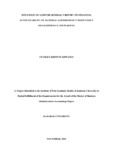INFLUENCE OF AUDITOR GENERAL’S REPORT ON FINANCIAL ACCOUNTABILITY OF NATIONAL GOVERNMENT CONSTITUENCY DEVELOPMENT FUND IN KENYA
Abstract
The Auditor General plays a critical role in the audit of public finances including the National
Government Constituency Development Fund (NG CDF). Public Finance Management Act,
2012 requires that at the end of each financial year the NG CDF shall prepare financial
statements. The audit of the financial statements of the NG CDF is critical in ensuring that
there is financial accountability in the usage of financial resources and the achievement of
objectives of the NG CDF. This study examined influence of auditor General’s report on
financial accountability of National Government Constituency Development Fund. The study
was guided by the following objectives: Management Action on Audit Queries, Types of
Auditor General’s Audit Exceptions, Attitude towards Auditor General’s Audit Reports and
Capacity to Close Auditor General’s Queries. The study was based on the descriptive research
design. Njoro constituency in Kenya was sampled for data collection. The target population
of this study were the NG CDF Accounting officers, management committee and the project
coordinators of various projects within Njoro constituency. Thus, this study had a target
population of 56 members that constitute the 10 NG CDF Accounting Officers, 30 NG CDF
management committee and 16 project coordinators of various projects. Reliability of the sets
of questions was examined making use of Cronbach's Alpha test of inner consistency. The
research study used descriptive statistics and inferential statistics (Correlations as well as
multiple direct regressions) in the analysis of data.This study utilized the agency theory,
dynamic capabilities theory and policeman theory to explain the relationships between the
variables. The study found a coefficient of determination (r2
) of 0.652 indicating that 65.2%
of the variability in the financial accountability that is attributable to the cumulative
independent variables. The achieved beta coefficients for NG CDF management action,
auditor General’s audit exceptions, attitude towards auditor General’s audit report, and
capacity to close auditor General’s audit queries had beta coefficients of 0.417, 0.596, 0.569,
as well as 0.492 respectively. The beta coefficients of all the variables suggested that increase
in the respective independent variables were connected with rise in the dependent variable
with the remainders of the variables maintained consistent. The research additionally
discovered that there was statistically considerable influence in between each of the auditor
general report and financial accountability. The research study suggested that NG CDF should
observe objectivity in taking management actions in order to enhance financial responsibility
of the constituencies. Among the components elements that the NG CDF officers ought to
observe include removal of the conflict of interest in the preparation of the financial reports

